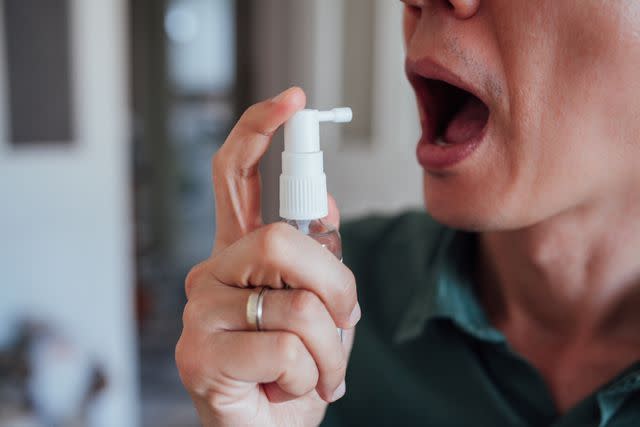Using Throat Spray for Irritating Symptoms
Medically reviewed by Benjamin F. Asher, MD
Throat spray is an over-the-counter medication that is taken to relieve symptoms of sore throat, itchiness, and pain. It numbs the area sprayed which will relieve symptoms but does not cure a sore throat.
This article discusses how to use throat spray and the types of spray available. It also discusses who should not use throat spray.

evrim ertik / Getty Images
How Throat Spray Works
A sore throat makes swallowing or talking painful. Causes of a sore throat include bacteria, viruses, and allergies.
Throat spray works through its numbing properties by providing fast pain relief for sore throats. Throat spray does not treat the underlying cause of sore throats. It only helps to relieve the symptoms.
Types of Throat Spray and Added Ingredients
There are two primary types of medication-based throat sprays:
Phenol: Chloraspectic throat spray is the popular brand name for phenol spray. The active ingredient is 1.4% phenol. It works as an oral analgesic/anesthetic to temporarily relieve throat pain, mouth irritation, and discomfort from canker sores.
Benzocaine/menthol spray: Also known as Vicks VapoCool Sore Throat, it is an oral anesthetic that contains 5% benzocaine and 1% menthol to relieve pain and irritation from sore throats and mouths.
Non-medicated throat sprays contain other ingredients that can alleviate mouth and throat pain. Elderberry is a supplement that is made and sold as a throat spray. Some research shows elderberry can relieve the symptoms of upper respiratory infections. However, more research on elderberry sprays is necessary.
How to Use Throat Spray
Throat sprays come in small bottles with spray attachments. Point the spray attachment to the area in the mouth or throat that you would like to cover. Spray the number of times directed by the medication's label.
For phenol spray, let the spray medication stay in the mouth and throat for 15 seconds.
Benzocaine/menthol spray should be gargled and swished throughout the mouth and throat for one minute.
Do not swallow either medication spray after allowing it to sit in the mouth and throat. Spit it out.
How to Not Let Throat Spray Cause Gagging
If the throat spray is causing gagging, hold the spray nozzle farther away from the mouth. Other ways to reduce gagging could include trying a different spray flavor, a throat spray with a different active ingredient, or not using a throat spray and sucking on throat lozenges instead.
Should Anyone Not Use Throat Spray?
Throat spray is a treatment that can help reduce the symptoms of sore throat. It is found over-the-counter and is generally considered safe for most people. However, some circumstances might prevent someone from using throat spray safely. Do not use throat spray if you have a sore throat accompanied by the following symptoms:
Headache
Nausea and vomiting
Issue with aspiration (accidental infiltration of food)
Other important notes about throat spray:
Do not use it if you have an allergy to one or more of its ingredients
Do not use it for more than two days
Benzocaine/menthol-based sprays cannot be taken by children under 12 years of age
Phenol-based sprays cannot be taken by children under 3 years of age
Throat Spray Alternatives
Sore throats can make working, playing, and daily activities difficult. If throat sprays are not effective (or for those looking for other options), there are several throat spray alternatives to help alleviate symptoms:
Drink plenty of fluids
Suck on ice chips or popsicles
Throat lozenges
Use a room humidifier
Take a spoonful of honey (only for those over 1 year of age)
A sore throat caused by a strep infection needs to be treated with an antibiotic. Home remedies can be taken with an antibiotic but should not replace it.
Summary
Throat sprays are a convenient over-the-counter medication for relieving the pain and irritation associated with sore throats. The spray numbs the throat, providing temporary relief. It does not treat the underlying cause of the sore throat. Make sure to follow the medication label directions and contact a healthcare provider if symptoms worsen or do not improve.
Read the original article on Verywell Health.

